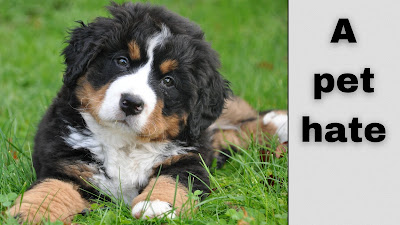[For an audio/vlog version of this story, click here.]
A farmer's work is never done. Be it tillage or livestock, caring for animals and crops is a perpetual process.
Anyone who has worked on a farm appreciates — or at least should appreciate — this.
 |
| Cute but costly. |
So it wouldn't be the worst idea ever mooted to have city dwellers, particularly the wealthier ones who will most likely rise to positions of influence and power, spend a year of their young lives labouring on a farm.
In this way, they might acquire a greater appreciation for the work required to keep the masses, rich and poor, munching contentedly.
Even better, with more hands-on labourers, the use of that damaging, polluting farm machinery would be reduced. It's one way to address the pullulation of princes and princesses which has resulted in a paucity of proles in high-income nations.
Virtuous vegans
Yet, for those earmarked to serve their time on livestock farms, I've no doubt there would be a fair few conscientious objectors.The objection: 'Raising animals for human consumption is a cruel and immoral practice, and one that also causes substantial environmental damage. Today's humans don't need meat and other animal products to survive. Thus, to partake in livestock farming is to knowingly and unnecessarily destroy the planet as we know it. I shall have no part in it whatsoever.'
Many who hold this view practice what they preach. They don't eat meat, and some don't even consume food from farmed animals that must be kept alive to get their produce, such as dairy products and eggs.
The vegetarian/vegan versus omnivore debate is far from novel. A recent renewal of it can be heard on BBC Radio 4's Moral Maze.
'The worst of these activists are those with an aggressive mongrel who believe that their little ball of fur is the God of dogs.'I've mentioned before on these pages that many in the comfortable classes could do with eating less meat. Some could do with eating less, full-stop.
Also, as somebody who was raised on a small cattle farm, I do realise that some livestock holders could, indeed should act in a more environmentally friendly way. What's more, in certain areas, cattle-raising is perhaps not the best use of the land at one's disposal.
So, I'm not unsympathetic to certain elements of the vegetarian/vegan stance.
Dog dinner
Where I do cry foul — and f·o·w·l —however, is with the militant-esque no-more-meat activists who are also pet owners, particularly those who keep cats and/or dogs.If one is vehemently against livestock farming in terms of cruelty and environmental damage, these same arguments can be aimed at pet owners.
Speaking about domesticated dogs specifically, most of them, particularly in urban areas, only get out and about when allowed to by their owners. They're not exactly free, are they? Their wild cousins in Africa would surely view such an existence as, at best, restrained.
OK, pet dogs are just that. They've been kept for centuries as human companions. Some of them are put to work, so they're not just a drain on the planet's finite resources. They contribute, they provide a tangible benefit. In certain parts of the world, people make a meal out of their mutts: not a dog's dinner but an actual dog dinner.
Yet, most dogs around today are pets and pets only. It's why, from the perspective of humans who like to be controlled and have most of their concerns taken care of by someone else, we have the expression, 'It's a dog's life.' (If I had to be one or the other, I'd choose to be a wild dog rather than one tied to a Homo sapien.)
These pets, of course, have to be fed and watered.
Carnivorous curs
According to Gregory Okin, a professor from the University of California Los Angeles quoted in an earth.org article, it's estimated that an average-sized dog generates 770 kg of carbon dioxide equivalent (CO2e) emissions annually. For an even bigger dog, the figure can be upwards of 2,500 kg, which is twice as much as the emissions from the use of a standard family car per year. An average-sized cat, for the record, can produce carbon dioxide emissions of about 310 kg in a year.That earth.org article also states that the meat consumption of pets in the US generates about 64 million tonnes of carbon dioxide annually, the equivalent of driving 13.6 million cars. If cats and dogs in the US were their own country, they would rank in the top six for meat consumption globally. (Another piece that delves into this area is The Guardian's Throw a dog a bean: how to reduce the carbon footprint of your pets. See, I'm not completely anti-The Guardian.)
This should give some pause for thought to any cat- and/or dog-owning vegan activist who hounds pet-less meat-eaters. One may not be as green as one thinks.
In my experience, the worst of these activists are those with an aggressive mongrel who believe that their little ball of fur is the God of dogs. A my-pet-can-do-no-wrong green Gestapo. It's often the case that the most vociferous on a certain topic are the most hypocritical.
Thus, it can be argued that farming livestock is closer to a net benefit for humanity, and perhaps even the environment overall, than keeping pets.
If we had to scrap one and keep the other, would humanity suffer more from the loss of pets or the loss of livestock?
Human consumption of dog meat might shoot up around the world if the latter were to come to pass.
__________________________________________________________
Listen to The Corrigan Cast podcast here.
Facebook: Wrong Way Corrigan — The Blog & IQuiz "The Bogotá Pub Quiz".
No comments:
Post a Comment